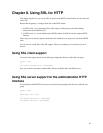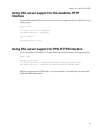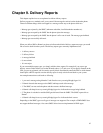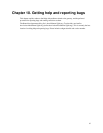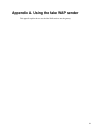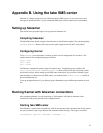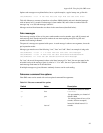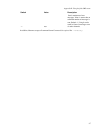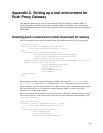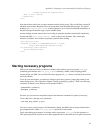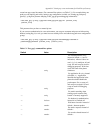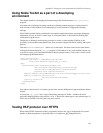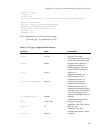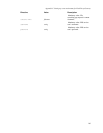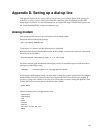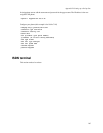Appendix C. Setting up a test environment for
Push Proxy Gateway
This appendix explains how to set a test environment for PPG. This contains a simulated SMSC, for
instance a http server simulation (this is used as example, because it is simplest) and a simulated push
initiator. Between them, there is the push proxy gateway to be tested. This means that you must configure
HTTP SMSC.
Creating push content and control document for testing
Here is an example of a push control document, which gives PPG instructions how to do the pushing.
<?xml version="1.0"?>
<!DOCTYPE pap PUBLIC "-//WAPFORUM//DTD PAP//EN"
"http://www.wapforum.org/DTD/pap_1.0.dtd">
<pap>
<push-message push-id="9fjeo39jf084@pi.com"
deliver-before-timestamp="2001-09-28T06:45:00Z"
deliver-after-timestamp="2001-02-28T06:45:00Z"
progress-notes-requested="false">
<address address-value="WAPPUSH=+358408676001/TYPE=PLMN@ppg.carrier.com"/>
<quality-of-service priority="low"
delivery-method="unconfirmed"
network-required="true"
network="GSM"
bearer-required="true"
bearer="SMS"/>
</push-message>
</pap>
Because the push content is sended to the phone over SMS, rigth value for network-required and
bearer-required is true, for network GSM and for bearer SMS. However, you can omit these
values alltogether, if you use a phone number as an address. Address value is international phone number
and it must start with plus. It is used here as an unique identifier, SMSC, or sendsms script must
transform it to an usable phone number.
Here is an example of Service Indication, a type of push content. Essentially, the phone displays, when it
receives this SI, the text "Want to test a fetch" and if the user wants, fetches the content located by URL
http://wap.iobox.fi.
<?xml version="1.0"?>
<!DOCTYPE si PUBLIC "-//WAPFORUM//DTD SI 1.0//EN"
"http://www.wapforum.org/DTD/si.dtd">
<si>
<indication href="http://wap.iobox.fi"
si-id="1@wiral.com"
action="signal-high"
created="1999-06-25T15:23:15Z"
98



